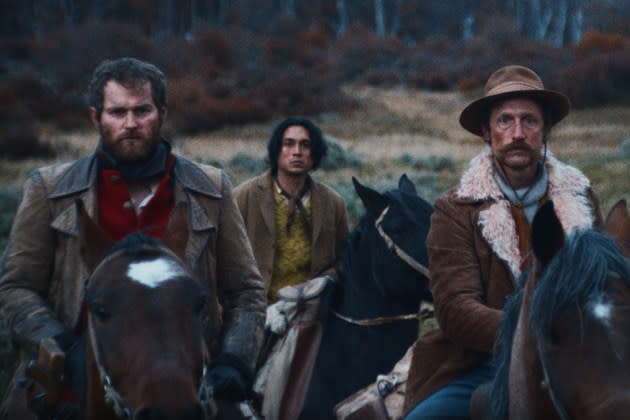‘The Settlers’ Review: Debuting Director Felipe Gálvez’s Provocative Look at Chile’s Colonial Past

There’s been a recent trend in international arthouse cinema that dates roughly back to two Argentine movies of the past decade: Lucrecia Martel’s Zama (2017) and Lisandro Alonso’s Jauja (2014).
Both films told dark tales of European colonization, and the massacres inflicted on South America’s Indigenous populations, in ways that felt altogether contemporary, eschewing traditional narratives in favor of something more enigmatic and modern. In such movies, the past was reflected through the lens of the present. The characters all wore period costumes and the sets were made to look like they dated from the epoch, but the stories being told, and the way they were being told, felt very much of our time, as if the horrors were still with us.
More from The Hollywood Reporter
Cannes: Sam Levinson Fights Back Tears After 'The Idol' Premiere
'Bread and Roses' Review: A Harrowing Look Inside the Fatal Fight for Women's Rights in Afghanistan
This trend continued, albeit in a more playful sense, in the Italian film The Tale of King Crab (2021), and in a more spiritual sense in the Iceland-set Godland (2022), both of which premiered in Cannes. This year, the festival offers another take on the genre with The Settlers (Los Colonos), a debut feature from Felipe Gálvez that chronicles the genocide of Chile’s native peoples at the hands of Spanish landowners, who brutally massacred tribes in the Tierra del Fuego region as they built their agricultural empire.
Gálvez, who co-wrote the film with Antonia Girardi, uses the template of a Western to tell his story, although it’s a Western carried by a postcolonial critique that gradually takes on the viewpoint of its sole Indigenous character, Segundo (Camilo Arancibia).
When we first meet him, Segundo is laboring with other native-born on a fence the Spanish are erecting to separate the pampas of Chile from neighboring Argentina. The work is ruthless and overseen by cruel masters who have no qualms about killing the injured, so when Segundo’s expert marksman skills get him recruited on a mission to clear grazing land all the way to the Pacific, it looks like he may be getting a better deal.
The mission has been commanded by José Menéndez (Alfredo Castro), a powerful player in Chile’s emerging economy who’s as merciless as Daniel Plainview. Indeed, there will be blood on a treacherous journey that takes Segundo, a war-torn Scottish lieutenant (Mark Stanley) and an American mercenary, Bill (Benjamin Westfall), who’s been imported from Texas, over mountains and across ravines until they reach the sea.
For much of its opening and middle sections, The Settlers functions like a three-handed western where the clashing personalities of Bill and the lieutenant — who we find out is, in fact, a private — come to a head while Segundo silently looks on. Divided into chapters with headings, and backed by a score from Harry Allouche with some echoes of Ennio Morricone, the film can feel a bit gimmicky when it leans too hard into the trappings of the genre, wearing its postmodernism all too prominently on its sleeve.
But when we gradually learn that the trio have been tasked with ridding the land of the Indigenous, things take a decidedly darker turn and the true focus of The Settlers comes into light. The film’s most harrowing sequence has Bill and the lieutenant massacring a tribe of innocents, then raping a female survivor. Segundo tries to avoid participating, but he’s drawn into committing an act of violence he cannot escape from, which leaves him traumatized and filled with regret. Even if he hails from a different tribe, he’s been forced to turn against his own people.
Shot in the Academy format by Simone D’Arcangelo, who did similar work on The Tale of King Crab, the film looks like an artefact from an older time, slowly zooming and panning across the monumental landscapes where the journey takes place. Yet while its stylings are purposely retro, its aims are very much of the here and now. This is a film that digs deep into Chile’s colonial past — especially during a closing section that transforms the story into one of historical reckoning.
But even then, Gálvez presents Segundo, whom the others refer to as “the half-breed,” less as an unlikely hero than as a victim who was lucky and resourceful enough to survive a terrible moment in Chile’s troubled birth. During The Settlers’ provocative epilogue, ambitious Chilean officials force the man to recount all that he saw on his mission, including another awful massacre, and he does so only because he’s once again given little choice. This may be his country’s history, but he wants no part of it.
Best of The Hollywood Reporter
Natalie Portman at Cannes: "I Need to Leave the Drama for the Screen"
Ailing ‘Superman’ Star Valerie Perrine Finally Finds Her Hero: "The Guy Should Be Sainted"

